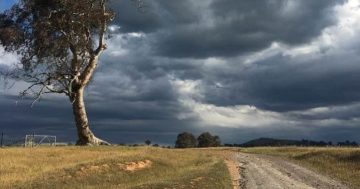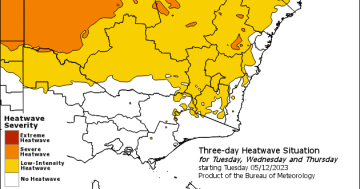
Ongoing smoke haze across the region may be impacting your health. Photo. Mary Mathais
Australia is being hit by the double whammy of extreme heat and bushfire smoke prompting renewed health alerts for the days ahead.
Added to this is the seasonal stress of Christmas and the prospect of holidays being disrupted due to bushfire. Even if you are not directly affected by fires, there may be stress from knowing people who are, as well as underlying trauma from climate disruption.
The Bureau of Meteorology is forecasting heatwave conditions through south east Australia over the next few days, there are a few tips for coping with the heat and managing symptoms.
Bureau meteorologist Sarah Scully says, “for many areas, severe to extreme heatwave conditions will be felt, so it’s important people follow the advice of health authorities, stay up to date with the latest forecasts and warnings from the Bureau and remember to check in on any vulnerable family and friends.”
Bureau climatologist Dr Blair Trewin says temperatures in many locations are forecast to approach or even exceed December and potentially annual records.
Australia’s warmest day on record occurred in January 2013, when the average maximum temperature across the continent was 40.30 ºC.
Southern NSW Health District (SNSWLHD) has alerted residents to keep well hydrated and cool to avoid heat-related illnesses with temperatures tipped to soar.
SNSWLHD Public Health Unit Director Tracey Oakman says, “extreme heat conditions can have serious impacts on peoples’ health.”
“It’s essential for your body temperature to stay in the range of 36.1 – 37.8 degrees Celsius.
“If it rises above 37.8 degrees, you may develop a heat-related illness. Our bodies have to work very hard and produce a lot of sweat to keep cool when the weather is very hot.”

Three day Heatwave Forecast. Image: BoM
Symptoms of heat-related illnesses can vary depending on the severity, but could include; restlessness, irritability, light-headedness, feeling confused, weak or faint.
To stay healthy in the heat, remember these four tips:
- Drink plenty of water – even if you don’t feel thirsty and avoid sugary and alcoholic drinks
- Keep cool – keep your body and your house cool by closing any windows and curtains/blinds
- Take care of others – check in on elderly friends, neighbours and relatives daily
- Have a plan – know who to call if you need help.
- People with severe signs of heat-related illness should seek urgent medical attention via their GP or the emergency department at their nearest hospital.
“We encourage you to look out for family, neighbours and other community members who may be more vulnerable to heat stress, or more prone to heat-related illnesses,” Ms Oakman says.
“Babies and children, older adults, people who are sick or unwell, and those with a chronic illness may all be more susceptible to heat stress.
“It’s also good idea to always have drinking water on hand and to drink plenty of it; to stay indoors or in the shade whenever possible, and to keep your body cool by having air circulating around you.”
Seek out community ‘cool places’, where residents can seek refuge from the heat, including public libraries, local pools and other indoor spaces.

See out cool places in a heatwave. Photo Alex Rea
Ms Oakman is also reminding people to never leave a person, particularly a child, older adult or a pet, inside a closed parked car, as the exposure to high temperatures inside can cause serious permanent injuries including damage to the brain or other vital organs, and in extreme cases, can result in death.
The ACT Emergency Services Association advises that to help someone with HEAT STRESS try to get the person to a cooler environment, lay the person down, cool them by applying cool, wet towels around the neck and underarms, if conscious, give cool fluids (preferably water) to drink and visit your GP or walk-in clinic.
Southern NSW Local Health District is also urging people with respiratory conditions to take extra care, with concerns poor air quality caused by bushfires may affect their breathing.
The gases in bushfire smoke include carbon monoxide, carbon dioxide, nitrogen oxides and volatile organic compounds.








